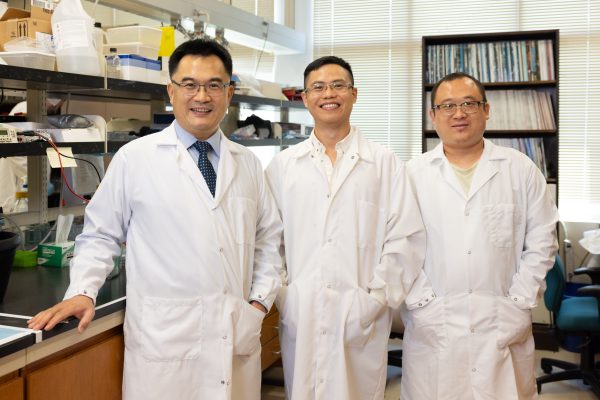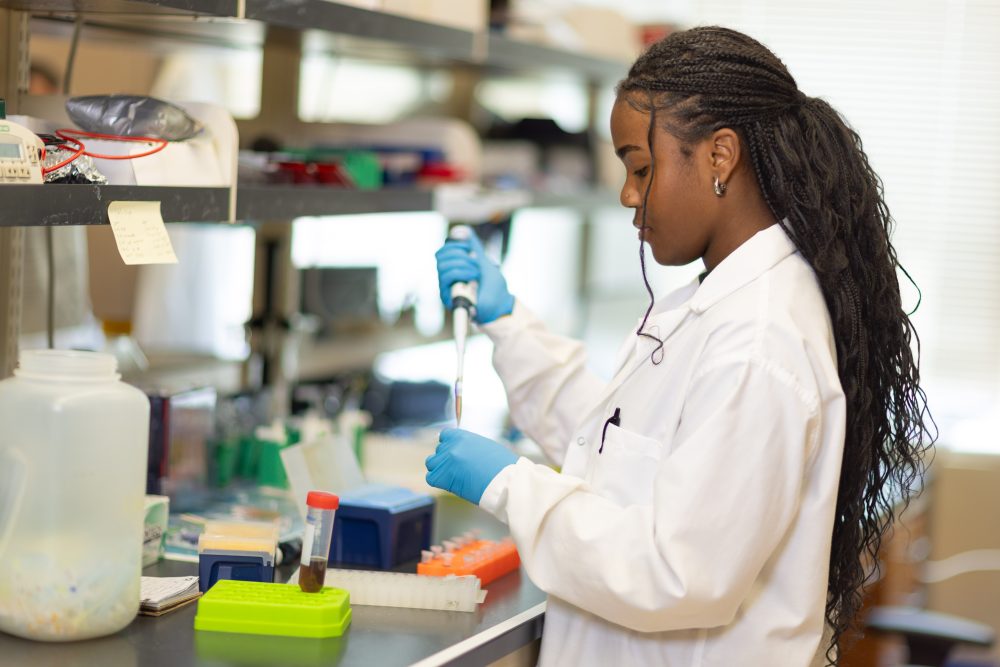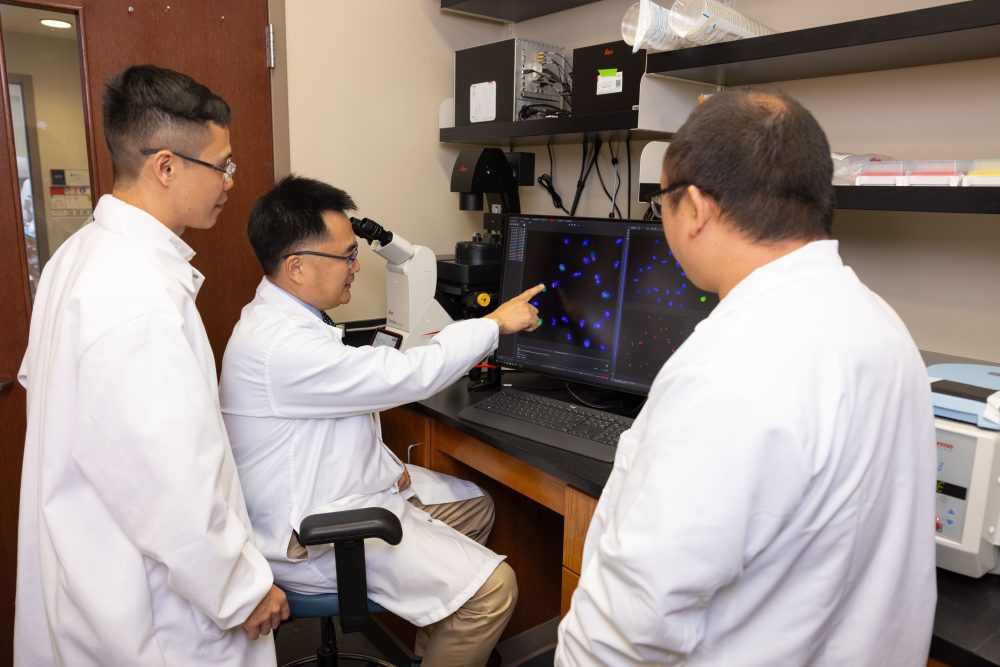New DNA Repair Research May Influence Cancer Clinical Trials ‘For Years To Come’

On the road to future cancer treatments, Shan Yan. Ph.D., is blazing his own path.
That was evident recently when – as published in Nature Communications – Yan and his research team at UNC Charlotte broke new ground in the functional understanding of the protein APE1 that jumpstarts human DNA damage repair.
The findings could prove vital to future clinical trials, enabling scientists to possibly test whether therapeutic targeting of naturally occurring but overactive APE1 could improve cancer survival rates.
The work has already been heralded as a “breakthrough study.” And, the paper represents the very latest published findings from Yan and his NIH-funded lab, which has gained prestigious funding, awards, and international recognition over the last decade.
Central to Yan’s ongoing research is the study of DNA single-strand break (SSB) repair and signaling pathways. By contrast, much of today’s approach to fighting cancer stems from past research on DNA double-strand break (DSB) – a lethal type of DNA lesion, long-targeted in cancer therapies.
Pioneering inquiries, however, show that SSBs can foreshadow the development of more lethal DNA damage. Yet, due to lagging research, little was previously known about APE1’s function – what Yan now calls the “molecular switch” that effectively turns on a cell’s attempt to repair SSB damage.

Yan, professor and associate chair for research in the Department of Biological Sciences, said researchers previously “lacked the technical advancement – this complicated design – to study this question.”
So, as Yan has become known for, he made a path where there was none.
An earlier breakthrough development of his – a novel highly purified plasmid DNA structure – became the foundation to unlock the latest discovery: how APE1 directly activates ATM signaling to start the repair of single-strand breaks.
In demystifying APE1, Yan said, “These findings will impact the field for years to come.”
Cancer Research at UNC Charlotte
One UNC Charlotte academic leader and researcher says the recent publication in Nature Communications affirms how Yan’s lab and others in the university’s Genome Integrity and Cancer Initiative (GICI) are “well positioned to meet current and future cancer research challenges.”

Christine Richardson, Ph.D., professor and department chair of Biological Sciences at UNC Charlotte, credits the unique and highly collaborative spirit of UNC Charlotte, saying this “fosters and values work between different research groups.” Yan, in addition to teaching and mentoring young researchers, is also the program leader of Charlotte’s GICI.
Richardson underscored the significance of the recent APE1 research, explaining: “How cells react to DNA damage and signal to halt cell proliferation and wait for repair is critical to maintaining genome integrity and avoiding mutations associated with diseases and cancer.”
Even normal human cells can experience up to 10,000 single-strand breaks per day.
“But quickly enough, it’s repaired,” Yan said. “We have very powerful repair mechanisms.”
However, a certain percentage of SSBs go unrepaired in the human body. Genome defects resulting from unrepaired DNA damage are thought to be contributors or the cause of a whole host of human diseases, including neurological diseases, cancer, and heart failure.
APE1, Richardson points out, is often overexpressed in cancer cells and is associated with poor survival of cancer patients.
“The research by Dr. Yan and his team,” she said, “provides the first and most significant direct connection between single-strand breaks and the activation of the ATM protein through action by the APE1 protein. This study provides the basis for developing new cancer treatments that target the overactive APE1 to block it or degrade it.”
Recent APE1 Findings
In “Distinct regulation of ATM signaling by DNA single-strand breaks and APE1,” Dr. Haichao Zhao, lead author on the Nature Communications paper and Research Associate in the Yan Lab, explains how the team at UNC Charlotte used unfertilized frog eggs to study the multifunctional enzyme’s role in DNA damage repair.
Among other findings, the publication details results showing SSB induces ATM activation prior to ATR, temporarily arresting cell cycle progression as DNA attempts to undergo repair. And – central to the study’s significance – the team discovered direct evidence for APE1’s active role in SSB-induced ATM DDR signaling.

“We demonstrate that APE1 promotes SSB-induced ATM DDR through at least two mechanisms: APE1 exonuclease activity-mediated SSB processing and APE1-mediated direct recruitment of ATM to SSBs,” researchers wrote.
Adding to science’s understanding of SSB DDR is crucial, Zhao said, as the APE1 research could help future clinical trials successfully attack cancer cells or protect non-malignant cells during cancer treatments.
“The more data or information about DNA damage (and repair) we have, the better we may develop treatments for cancer patients,” Zhao said.
Such pioneering work, Richardson added, will continue in the GICI focus group, which is centered in Biological Sciences with over 40 researchers from 10 departments, representing two schools and two university-funded centers.
At the center of GICI is a core group of seven Biological Sciences faculty who research genome integrity. The broader group extends to cancer-omics and computational modeling, cancer therapeutics, and health disparities.

“GICI,” Richardson said, “will synergize with the recent relaunch of the Center of Biomedical Engineering and Science that will enable stronger connections between basic scientists at UNC Charlotte and clinicians at Atrium Health and Wake Forest Medical School.”
For Yan’s part, he’s focused on developing future research at the cellular and molecular levels.
“Any translation of clinical studies must go back to the understanding of these processes … But this is the most difficult part,” he said.
“My philosophy of being a scientist is to do cutting-edge but also leading research. I design my research direction and projects based on my logical understanding. I want to be unique and distinctive from others – I don’t want to be a follower,” said Yan.